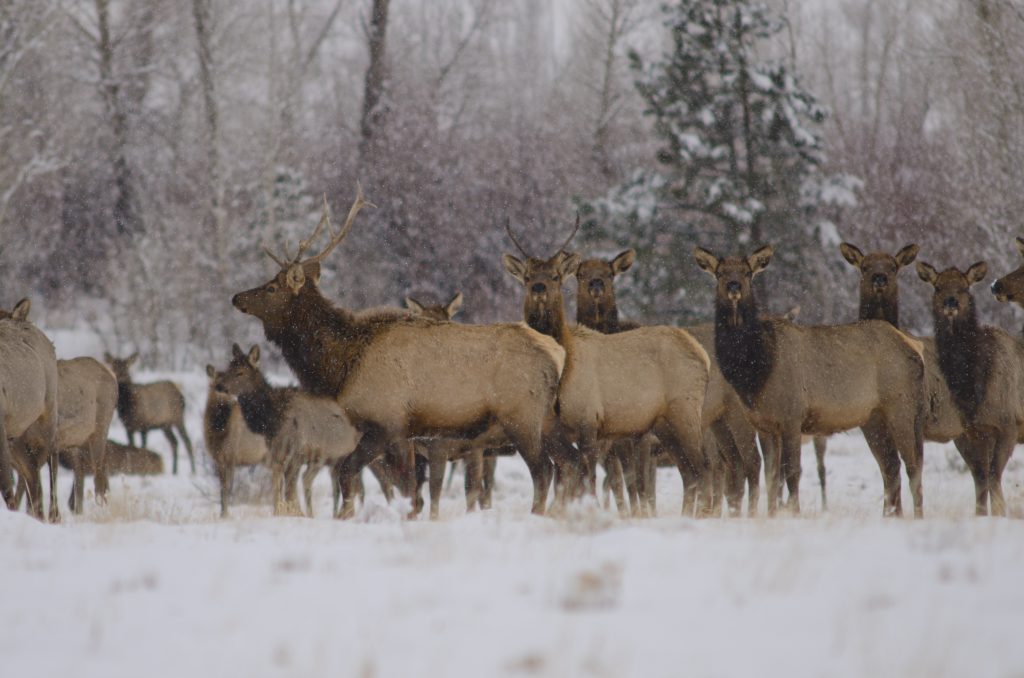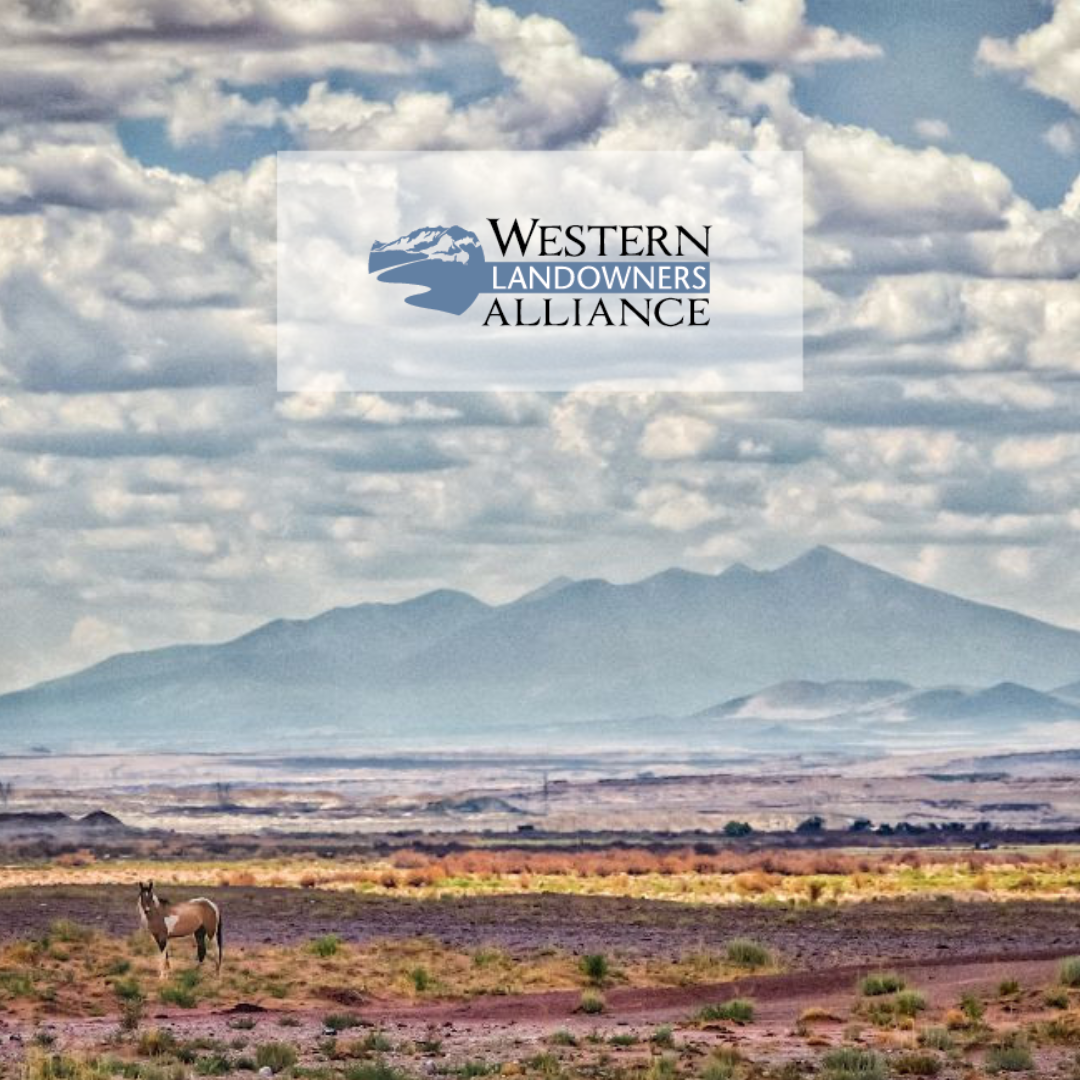Western Digest – January 2019
News and opportunities on working lands, water and wildlife

Happy New Year! We hope that the beginning of 2019 brings you high snowpack, warmth and winter rest. Articles in this issue range from a look at ranching in the future to female ranchers reclaiming the West and from wildfire mitigation to cooperative conservation to a survey to improve voluntary conservation programs. Enjoy!
This member monthly includes pertinent working lands, water and wildlife news and opportunities from around the West. If you have any information that you think would be valuable for this digest, please send me an email. I’d love to hear from you!
Hallie Mahowald
Stewardship Services Director
Working Lands Economics
- Ranching in the Future: What should young ranchers expect? A look at past, present and future ranching models: OnPasture.
- CO Drought and Economic Losses: Colorado’s farming and ranching communities are facing a season of economic losses, after summer drought dried up grass for cattle, killed crops and kept thousands of acres from being planted: KRCC.
On the Range
- Cattle and Songbirds in the Great Plains: Ranchers and environmentalists are partnering to curb the decline of prairies and songbirds in the Great Plains: National Geographic
- Female Ranchers Reclaim American West: As men leave animal agriculture for less gritty work, more ranches are being led by women — with new ideas about technology, ecology and the land. Women are leading the trend of sustainable ranching and raising grass-fed breeds of cattle in humane, ecological ways: New York Times.
- WWF Sustainable Ranching Initiative: World Wildlife Fund (WWF) is working with ranching communities to maintain healthy grasslands, viable wildlife populations and economic and cultural resiliency for ranchers as a means to prevent the conversation of ranching lands to cropland, energy development, urbanization and other uses: AgWeek.
- CO Women in Ranching: This article features WLA member San Juan Ranch and highlights in the importance of women in ranching and land stewardship – Colorado Springs Gazette.
- Ruby Valley Stewardship Alliance: Montana ranchers and conservationists work in harmony for the common interest of the Greater Ruby Valley and employ ideas that benefit the community that calls it home: Tri-State Livestock News.
Wildlife
- Cooperative Conservation: A new policy paper on cooperative conservation explores how cooperative solutions can help improve conservation outcomes for endangered species by better engaging private landowners: Center for Growth and Opportunity.
- Energy versus Wildlife: An op-ed explores the potential effects of Trump’s energy dominance mandate on mule deer migrations in Wyoming: High Country News.
- Drilling Plan Threatens Sage-Grouse Habitat: The Trump administration recently detailed its plan to open nine million acres to drilling and mining by stripping away protections for the greater sage-grouse: New York Times.
Water
- Thick Forests Reduce Snowpack: Thick forests can reduce snowpack, a critical water storage and source in the West: Oregon Public Broadcasting.
- Water and Common Ground: A rancher and an ecologist hike the desert, hunting for water and common ground on the San Pedro River: Arizona Central.
- NM Water Commission Revamp: The process for making appointments to the New Mexico Stream Commission, charged with protecting, conserving and developing water resources across the state, would be overhauled under a measure being considered during this legislative session: US News.
Forest & Fire
- ID Shared Stewardship: In December, Idaho signed a Shared Stewardship Agreement under its Good Neighbor Authority with the U.S. Forest Service. The agreement is a collaborative effort to co-manage lands and promote forest health, allowing the state and the federal entities to mutually establish priorities, set goals and accomplish projects: Idaho Press.
- Wildfire Mitigation: Here are sixteen examples from across the country of wildfire mitigation work that has been tested, and proven effective, by later fires: Fire Adapted Communities Learning Network.
- Barriers to Prescribed Fire: A new report presents key findings from an investigation into policies that limit managers’ ability to conduct prescribed fire on US Forest Service and BLM lands in 11 western states: University of Oregon.
- Post-Fire Support: Washington’s Cascadia Conservation District is working with landowners and other partners on wildfire recovery efforts to mitigate the after-effects of wildfires: National Association of Conservation Districts.
Policy
- Farm Bill = Big Win: WLA’s Lesli Allison describes how successful passage of the 2018 Farm Bill Equals is a big win for Americans: ColoradoBiz.
- New CO Ag Commissioner: Jared Polis, Colorado’s new governor, named Kate Greenburg (formerly with National Young Farmers Coalition) as the state’s new commissioner of agriculture: Western Farmer-Stockman.
- USDA FSA Offices Reopened: On Thursday, January 24, USDA reopened all its Farm Service Agency offices with furloughed workers providing an expanded set of services for farmers: Agri-Pulse.
Tools & Resources
- Noble Land Stewardship Program: The newly launched Noble Land Stewardship Program is designed to quantify the ecologic and economic benefits of managing land with a stewardship ethic as a focus: Noble Research Institute.
- SW Drought Preparation Plans: Guide to Co-developing Drought Preparation Plans for Livestock Grazing on Southwest National Forests aims to address the management of livestock grazing on national forests in the southwest and is aimed at helping Forest Service staff and private landowners to co-develop plans for increased preparation for drought: University of Arizona Cooperative Extension.
Opportunities
Funding
- Landscape Conservation Catalyst Fund: The Network for Landscape Conservation (NLC) announced the launch of a major five-year national grant program to accelerate the pace and practice of collaborative conservation at the landscape scale. The Landscape Conservation Catalyst Fund will distribute at least $1 million in funding to landscape conservation partnerships across the United States over the first three-year period, and offer supplemental training and mentoring to grantees. The program RFP will be announced on March 1, 2019: NLC.
- Grant to Reduce Livestock/Mexican Gray Wolf Conflicts: The Arizona Livestock Loss Board is now allowing ranchers to seek grant funding to assist in employing measures designed to prevent conflicts between cattle and Mexican wolves. The reimbursement program is designed to provide compensation to livestock producers who incur costs to their operations from Mexican wolves with the goal of increased tolerance for the presence of this subspecies on working landscapes: Arizona Game & Fish.
Employment
- Quivira Coalition New Agrarian Program Northern Coordinator: The Quivira Coalition, a Santa Fe-based nonprofit that builds resilience on arid working lands, seeks a coordinator for our New Agrarian Program (NAP). This position will be based in the Northern Great Plains (eastern Montana or Wyoming, or western South Dakota), and the coordinator will work remotely from the Santa Fe offices. Quivira Coalition.
- Forest Stewards Guild Southwest Program Assistant: Based in Santa Fe, NM, the Southwest Program Assistant will work on projects related to our Forest Stewards Youth Corps program, forest restoration and prescribed fire projects, Fire Adapted Communities, Community Wildfire Protection Planning, and ecological and socioeconomic monitoring. Applications are due February 1. Forest Stewards Guild.
- Thousand Hills Farm Internship: Thousand Hills Farm near Clearwater, Minnesota is looking for an intern who has experience and is interested in regenerative agriculture and grassfed beef. Applications are due March 1. Learn more here.
- Defenders of Wildlife New Mexico Representative: This position is responsible for implementing assigned Defenders’ strategic plan conservation objectives and strategies in New Mexico, with a focus on conserving both state and federally listed threatened and endangered species: Defenders of Wildlife.
Other
- Survey to Improve Voluntary Conservation Programs: WLA is currently assisting researchers at Duke University in understanding landowner experiences with voluntary conservation programs like Safe Harbor Agreements and Candidate Conservation Agreements with Assurances. This information is important to WLA and to agencies in working to improve these programs both for landowners that utilize them and agencies that implement and manage them. If you are familiar with these programs and are willing to assist with this project, please fill out this survey. There is survey for landowners and a survey for non-landowner agency partners.
- CO Ag Watershed Survey: Colorado Cattlemen’s Association (CCA) Ag Water NetWORK (www.agwaternetwork.org) is initiating a survey of agricultural producers to determine their familiarity with watershed management plans. The web-based survey asks producers about their water-related needs and priorities, and solicits feedback on their interest in being involved in local watershed management planning efforts.
Events & Webinars
- February 5-6: Plan, Prepare & Pass it On: Ag Business Strategies for Today & the Future workshop in Billings, Montana.
- February 5-7: RiversEdge West’s 2019 Riparian Restoration Conference in Phoenix, Arizona.
- February 5-7: Utah All Lands All Hands Summit in Salt Lake City, Utah.
- February 5-7: Holistic Management Practices for Profitable Ranching and Livestock Management Workshop at JE Canyon Ranch near Branson, Colorado. Contact JJ Autry at 719-859-4832 or at jj.autry@tnc.org to learn more and register.
- February 8: Cultivating Resiliency for Women in Agriculture online seminar – Building and Maintaining Relationships in Stressful Times.
- February 8-9: Cover Crops, Companion Crops & Dry Farming Workshop at Paicines Ranch, California.
- February 21-22: 2019 Family Farm Alliance Annual Conference in Reno, Nevada.
- February 23: Rio Chama Watershed Congreso 2019 at Ghost Ranch in Abiquiu, New Mexico.
- February 28 – March 1: Land & Water Summit 2019 in Albuquerque, New Mexico.
- March 4-5: California Climate & Agriculture Summit at UC Davis, California.
- March 8: Cultivating Resiliency for Women in Agriculture online seminar – Increasing Your Joy and Happiness While Living a Farm Life
- March 18-29: Women-In-Fire Training Exchange (WTREX) at Tall Timbers Research Station near Tallahassee, Florida. Applications are due January 4, 2019.
- March 26-28: Wildland Urban Interface Conference in Reno, Nevada.
- April 1-3: After the Flames Workshop and Conference in Denver, Colorado.
- April 3-5: The Grassfed Exchange Conference in Santa Rosa, California.
- April 12: Cultivating Resiliency for Women in Agriculture online seminar – Putting it All Together
- April 18-19: AgriSummit 2019 in Salida, Colorado
- April 29 – May 3: 6th International Fire Behavior and Fuels Conference in Albuquerque, New Mexico. The conference theme is “Fuels of Today–Fire Behavior of Tomorrow,” and will be held simultaneously in Albuquerque, Sydney (Australia) and Marseille (France).
- May 4: Wildlife Community Preparedness Day
Membership
The Western Landowners Alliance advances policies and practices that sustain working lands, connected landscapes and native species.
Not yet a member? We invite you to Join Us.
Join WLA to stay up to date on the most important news and policy for land stewards.
Become a member for free today and we will send you the news and policy developments critical to the economic and ecological health of working lands.
WLA works on behalf of landowners and practitioners throughout the West. We will never share your contact information with anyone.
©2026 Western Landowners Alliance • PO BOX 27798, Denver, CO 80227 • 505.466.1495
Western Landowners Alliance is a 501 (c)(3) non-profit recognized by the IRS.
Tax ID: 46-1346488

